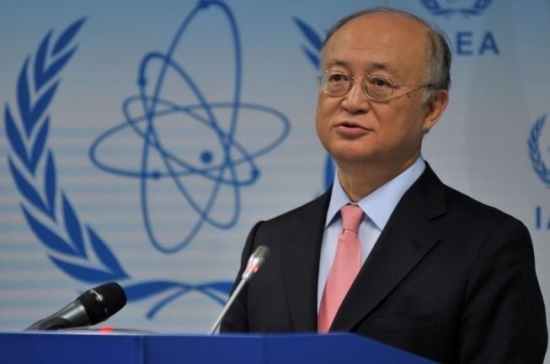17 Aug 2016
17 August 2016
By Andrew Green, IAEA Office of Public Information and Communication

Singapore is an important partner for the IAEA and a strong example of South-South cooperation with its sharing of expertise with countries in the region, IAEA Director General Yukiya Amano said on Monday in Singapore.
In January 2015, Singapore and the IAEA signed an agreement to enhance cooperation in capacity building which has already brought together more than 60 experts from Asia and the Pacific. The agreement has also led to the organisation of various courses and initiatives such as new fellowships on nuclear medicine and a regional workshop on national legislation.
Since 2006, more than 300 Singaporean experts and fellows have been trained through IAEA support in radiation medicine and health, radiation safety, nuclear security, isotope hydrology and nuclear technology applied to industry in the areas of materials testing and characterization. These experts can now share their knowledge with neighbouring countries.
In April 2014, the government launched a nuclear safety research and education programme to be implemented over five years. The IAEA supported the training of scientists from different Singaporean research institutions at the IAEA’s nuclear applications laboratories in Seibersdorf, Austria, and Monaco, as well as at the IRSN institute in France.
The IAEA and the Environmental Health Institute of Singapore’s National Environment Agency are also working on various mosquito control techniques. Singapore’s approach, whilst not using radiation, share similarities with the radiation-based sterile insect technique (SIT) that IAEA Member States have used successfully around the world to suppress target insect populations. This SIT method involves the breeding and rearing of males of the target insect species that are sterilized using radiation before being released. They mate with females in the wild, but this mating does not produce any offspring, diminishing the insect population over time.
In November 2015, the IAEA, the Institute and Singapore’s Ministry of Foreign Affairs jointly organised a training course for researchers studying approaches that rely on sterile insects. This initiative brought together experts and participants from across Southeast Asia to share relevant experiences, knowledge and expertise, and fostered cross-learning across the different teams working on the various methods.
During his visit, Mr Amano met Minister for Foreign Affairs Vivian Balakrishnan, Minister for Trade and Industry (Industry) S. Iswaran and Chief Executive Officer of the National Environment Agency Ronnie Tay. He also visited the Singapore Nuclear Research and Safety Initiative (SNRSI) Laboratories, and the new Protective, Analytical and Assessment Facility for security-sensitive materials officially opened in July 2016. Singapore was his last stop on a regional tour that included Thailand, Australia and New Zealand.
Ask MFA